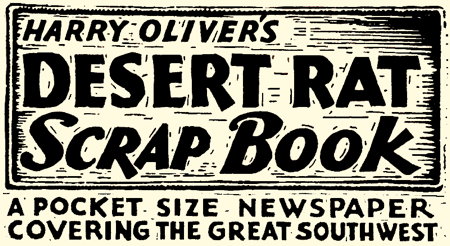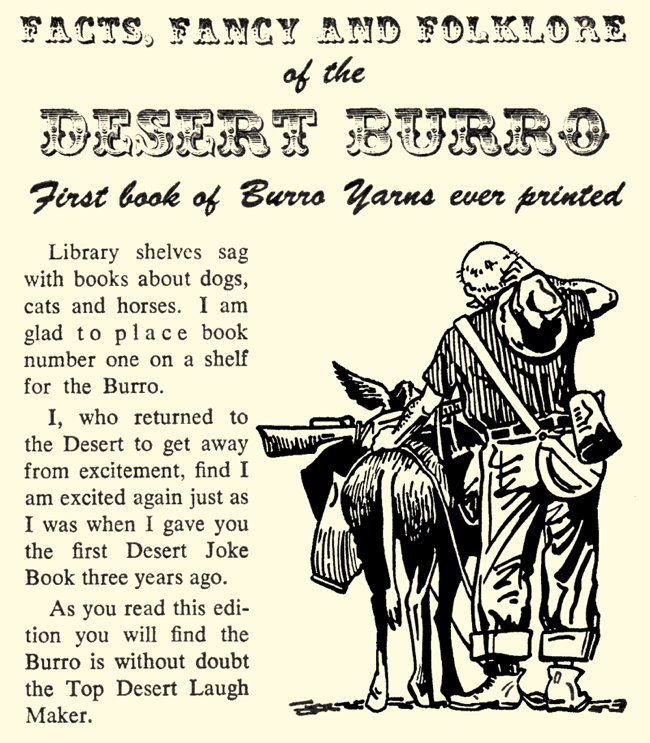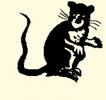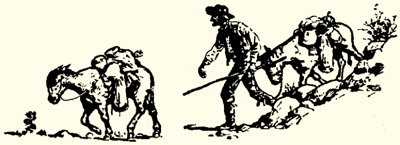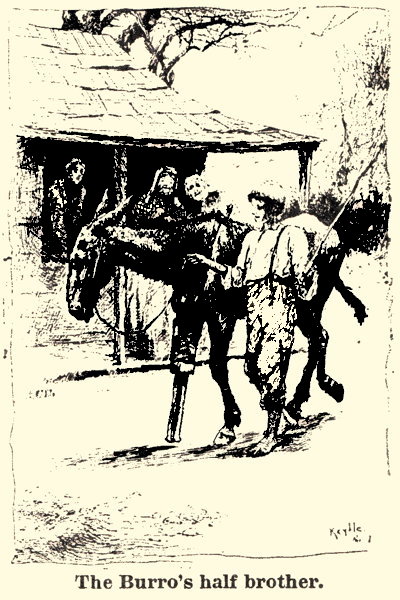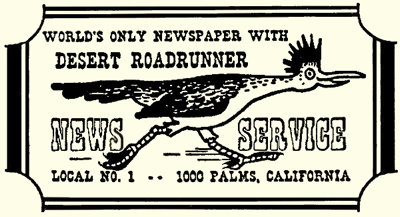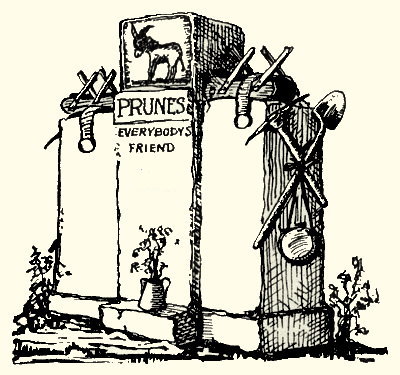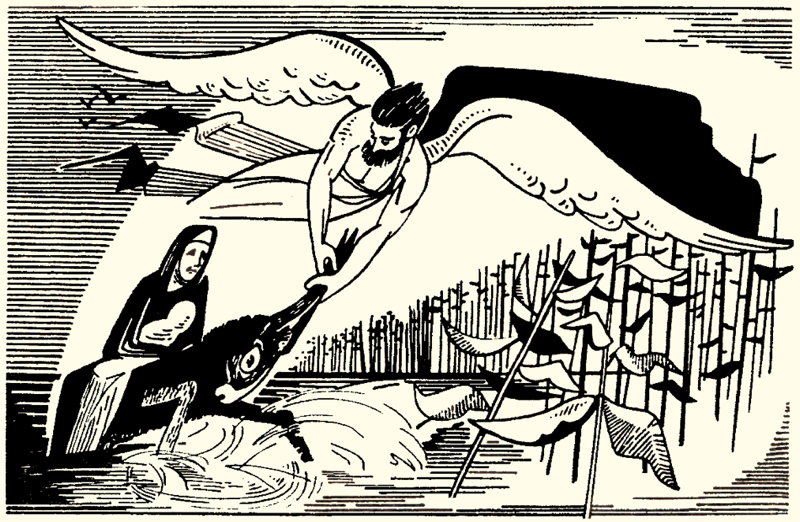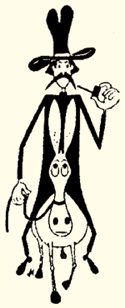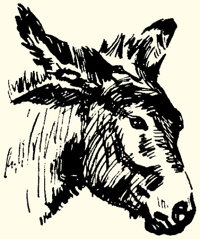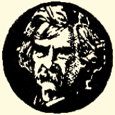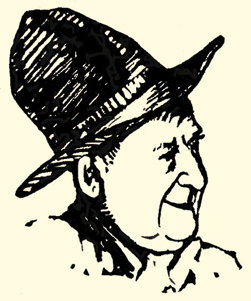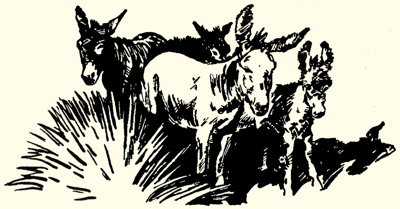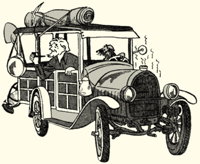BACK HOME COVER THIS IS HISTORICAL INFORMATION ONLY
PRICE 10 CENTS . . . . . . . ONLY ONE LOUSY THIN DIME
PACKET ONE OF POUCH SEVEN
JACK ASS EDITION
PUBLISHED FOUR TIMES A YEAR
ONLY NEWSPAPER IN AMERICA YOU CAN OPEN IN THE WIND
THIS PAPER PRINTS ONLY NEWS THAT STAYS FRESH
Smallest newspaper in the world and the only 5 page one.
Packet 1 of Pouch 7
![]()
This paper is not entered as 2nd class mail. It's a first class newspaper.
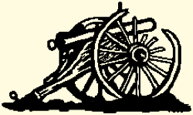
"Sin" my cat says Burros have the craziest mew—or me'ow.
![]()
To be occasionally quoted is the only fame I care for.
![]()
HOW SHADOW MOUNTAIN GOT ITS NAME
By Harry Oliver
In the year 1888, as the story goes, a desert rat hired a burro in the summer time, to pack a load from Palm Springs to Dos Palmas. At noon, when the sun was very hot, both he who had hired the burro and the owner of the animal wanted to sit in the shade of the burro, they fell to thrusting one another away. The owner insisted that he had hired out only the burro and not the shadow. The Desert Rat insisted that as he had hired the burro, all that belonged to the burro was his.
Old timers say the fine point of the burro and his shadow remains unsettled to this day, but the name Shadow (later Shadow Mountain) has stayed through the years. Today most folks come to Palm Desert not for shadows, but to enjoy the winter sun.
HERMIT BUSINESS PAYS OFF
This Old Desert Rat is all perked-up, in a roguish way, for I have been officially put in print in "WHO'S WHO IN AMERICA," but others don't seem to think so much of it all, and say so. Ward Grant, Coachella Editor says, instead of calling me just plain "Desert Rat" I should at least be called "Prize Desert Rat." Garland Griffin, Riverside Editor, says that I sure picked a field that wasn't too crowded. While Phat Graettinger, Palm Springs Editor, says that with my six cats, a Dog, a Crow, A Burro and a Tortoise, they should have put me in "Whose Zoo" instead.
Guy Bogart, President of National Cat Week, says, "If the truth was known, my Cat dragged in this story." George Fitzpatrick, Editor, New Mexico Magazine, says, "That Desert of yours must be getting to be an awful sissy place when they start putting you in a book along with a bunch of professors and college presidents."
I think this honor, glory, fame or renown has some good in it. I have all ready had 17 free drinks account of it and a lady I gave a kitten to says that she is naming it after me. It should not change this paper as I have said over and over it's to stay this same size and only be printed 4 times a year.
Here is a copy as it was printed in the May, 1954, Monthly Supplement of Who's Who in America:
"OLIVER, Harry, editor, showman, desert publicist: b. Hasting, Minn., Apr 4, 1888; s. Frederick William and Mary (Simmons) o; ed pub. schs., Eau Claire, Wis.; art courses Hollywood, Rome, Tahiti; m. Alice Fernlund, June 27, 1910 (dec. 1935); children—Mary (Mrs. Robert C. Ballenger), Amy (Mrs. George Roessel). Art dir. Hollywood, 1912-42, Italy, 1924, Ireland, 1932, France, 1925, Mexico, 1934, Tahiti, 1926; staged Gold Gulch at San Diego Expn., 1935; wrote daily newspaper column Desert Briefs, Ariz. and Cal. newspapers, 1941; editor, pub. Desert Rat Scrap Book since 1946; originator and producer desert folklore outdoor shows. Author: Desert Rough Cuts, 1938; 99 Days in the Desert, 1941; The Old Mirage Salesman, 1952. Adress: Old Fort Oliver, Thousand Palms, Cal"
The Mutiny Is Over
I go to my atom-bomb-shelter for refreshment without fear. My Cats, the Crow and the Dog, who got so fancy with the last Packet, lost interest when I told them this was to be the Burro Edition. They all are busy with other desert adventures. The Cat is looking at the new styles in coats. The Dog keeps his thoughts to himself. The Crow took a message up in the hills to the Burro (I sent for him), but the Crow fell in with some Raven's so went back to do some worming before the fishermen get there.
Raffles the Pack Rat has gone as crazy as a Sunday-Rock-Hound — "uranium crazy." He's headed for the high desert his note said. He left "Sticky Fingers" (who is only 5 weeks old) left him in my coffee cup. His note says, I am to make Sticky practice every day. I am to hide buttons in my pockets and see that he picks my pockets 3 times a day before I feed him.
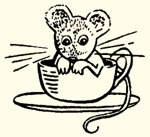
Sticky Fingers
Just a little amateur pick-pocket
Son of Raffles the amateur cracksman.
So your guess is—that there is a Pack Rat edition coming soon — YOU ARE RIGHT — make your story short—if you have one—you will get nothing—but your name will be spelt right.
BURROS
Just a word about this Old Fort for any of you readers that have not read the oft told story of the days here before the Railroad came. Days when theis Old Fort with its high adobe walls was sort of a kindergarten for baby Burros. When a baby Burro was born on the trail (steamboat days) between here and Ehrenberg the packers would carry the baby in here, then make the trip knowing that on their return the Mother and Baby would be O.K. You see Great-Uncle Enrigo Oliveres would set up all night to shoot a Mountain Lion.
This is the story just as it has gone into so many corner-stores for the last 70 years.
![]()
Hasn't Quite Gotten the Range
"Doesn't that Burro ever kick you?"
"No he ain't yet, but he frequently kicks the place where I recently was."
Both the North and South admit the Army Mule won the Civil War.
![]()
Can't Keep the Other Animals out of the Act
"Scoop" the Road-runner, my star reporter, says, this news story cannot wait, says, the Burros can spare a few lines, and this will still be an all Burro packet. Here is the story in brief—
Dry Camp Blackie has made a deal for acreage near Old Fort Oliver. Blackie is starting a Pack Rat Farm. He says a tame Pack Rat is the smartest of all pets, clean and easy to train, fact is Blackie, says that they can be trained to bring your pipe and slippers if you don't have a wife or dog. Blackie also pointed out that you can train them to go next door for their food (a savings). Magic—he is sure that soon the man with a Pack Rat in his pocket will be the life of any party. That's "Scoops" story.
OLD PRUNES
By Everett Bair
Fairplay Wept and Remembered
When the End Came for Prunes,
Rupe Sherwood's Faithful Burro
Half way up Fairplay's famous old Front street stands a humble monument crudely fashioned of dull gray cement. The simple epitaph recorded thereon by unskilled but sincere hands expresses the homage mountain folk extend to a burro:
"Prunes, a burro — 1867-1930. Fairplay, Alma, all mines in this district."
The story of Prunes rightfully goes back to Beloit, Miss., where in 1949, there was born a boy destined to be a wanderer. At the age of 5 his father died; four years later his mother passed away, leaving the urchin on his own. At the age of 12 he stowed away in a covered wagon that was part of an overland train taking horses to California.
We find him in early manhood hunting buffalo with Buffalo Bill. Later he rode into Denver City in a covered wagon, fascinated by the lure of gold.
And so came Rupert sherwood westward to the Alma-Fairplay gold mining district. At Alma, Rupe, as Sherwood was to be known, met and bought Prunes, with whom he was to keep company for almost forty years, and with whom, through his own dying request, he was to share the same grave.
Prunes worked and associated with early miners as if it were his solemn obligation, equally with theirs, to build trails, pack down the ore and help mold the struggling Colorado territory into the great state it is today. Many a fortune in rich ore was carried by the shaggy little jack down the steep trails to the mills below.
Finally came the day when Rupe Sherwood pensioned his faithful companion. Prunes had worked enough. He was loosed to the pleasure of making daily rounds to the back doors of Alma, where his nuzzle at the door latch was recognized by ever child in the camp.
Shed Prison
He kept fat on the handouts, but after several years it was noticed that he was failing. An examination revealed that he was losing his teeth.
One day a blizzard struck Alma, and for a week the snow piled high. Prunes selected an old shed for his shelter. The door blew shut and he was imprisoned.
Finally, when the sun broke through, a search was made and Prunes was found gaunt and weak. Friends showered flapjacks on him, but it was plain he was not his former self. Many old-timers wept at the thought of their little pal nearing the end.
Surprisingly, Prunes made it through that winter and well into May of 1930. But it was only too obvious that the tired old legs would not hold up for long.
A meeting of the miners was held. They decided that the humane thing to do was to end the earthly struggles of the camp's long-eared pet. Rupe Sherwood, weeping like a child, exclaimed, "We're both old-timers from way back. Lord, I'd hate to see him killed, but I s'pose it's for the best."
Prunes was shot and his mail carcass deposited on an Alma dump. Leading Colorado newspapers carried the news of his death. Many a grizzled miner shook his head at the thought of the carcass lying on a dump.
Last Trail Out
Proprietor Rardin of Fairplay's Blue Light cafe was the first to put sentiment into action. He with the help of many others, built the present monument, dug a grave, recovered Prune's skeleton from the dump and brought the bones to the tomb.
More than a year passed, and Rupe Sherwood, now 82 years of age, also found his old legs weakening. He was removed to the Fairplay hospital where he died Sunday, Aug. 23, 1931.
When Rupe realized he was on his last trail out, he made a strange request: That his remains be cremated and the ashes buried just back of the bones of his companion of forty years.
Five hundred persons attended the burial ceremonies. Justice Hilliard of the Colorado supreme court delivering the eulogy.
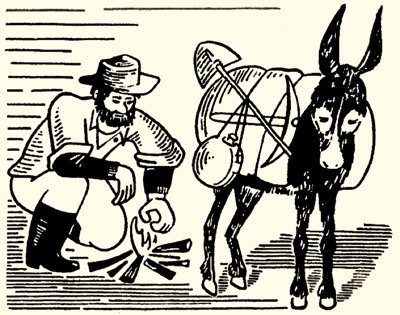 THE BURRO
THE BURRO
AS I KNOW HIM
By HARRY OLIVER
As printed in the FORD TIMES, October, 1948—
thanks to William D. Kennedy, Director of Publications
Old desert men will tell you "A mule knows three times as much as a horse, and a burro is smarter than a mule."
Burros take their time, refuse to hurry and if you try to hurry them, they get stubborn and nothing can be quite as stubborn as a stubborn mule. You can build a fire under them and they will step along the trail far enough to get from the flames and then stop and take root again. But when a burro starts moving, he'll go on tirelessly in a slow sleepy way, covering a lot of country and the rougher the trail, the better.
They are wonderful companions on the lonely trail, being in turn kind, playful, mischievous, sympathetic and understanding. In a string of 12 burros you will find 12 different dispositions to deal with. To me they all have a little of the bully of the schoolyard in them; each has a chip on its shoulder. They are always playing a game. If I am in the lead, they lag; if I bring up the rear, each sets out to engineer the speed of the string, browsing as they⁸the 12 bosses—boss the show.
"The wildest thing in the Wild West is a mother burro, if her baby's safety is at stake"—a burro will give a mountain lion a bad time. Today the burro's worst enemies are the hunters for the dog food canners. In the Mojave Desert old timers are trying to pass a law to stop these hunters. "Pekingese devour more wild burros than mountain lions," it is said.
I have heard a hundred stories of a burro turning a rock, taking an unplanned trip up a canyon or straying to just the right spot, thus receiving the credit of the discovery of a mine.
Old timers will all tell you of the dramatic and sometimes heroic role burros have played in the conquest of the West. Many a prospector has followed his burro to a waterhole, in fact they are credited with the discovery of most of the desert's springs.
The Spanish brought the burros to this country 300 years ago and from Mexico comes this story as to how they got their long ears:
"According to legend, one of the donkey tribe walked into quicksand, which alone is one big weakness of donkeys as it causes them to lose all sense of reason; this donkey was carrying the Virgin and the infant Jesus. San Gabriel, watching from above, noted his danger, and pulled him out by the ears, which then stretched to such a length as all burros have now. Thusly, in water all its descendants lose their courage, seems as though they always depend upon heavenly aid to get them out.
I have but one burro today—she's old and oh so smart—my youngest daughter gave her to me to keep, because she said she wanted to repay me for "Paint."
When my children were young, I would catch a young burro a week or so old, fold its long legs under it and bring it home to the kids. "Paint" was one of those. I don't think I will ever forget little Mary at about six with the fuzzy pinto baby burro snuggled in her bed, the two babies sound asleep.
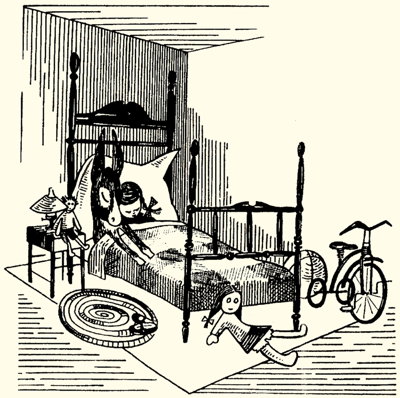
Most of the Burro pictures in this packet were drawn by Maggie Gerke a talented young artist who has left the Desert . . . flat . . . She is today perched high on a hill above San Francisco ready for new artistic triumphs.
A Burro discovered a mine that has paid $43,000,000.00. The Bunker Hill and Sullivan Mine at Kellogg, Idaho, was legally declared to be discovered by a Burro, in 1885.
![]()
NO LAWS FOR THE BURRO
Only the wild creatures that find enough of the right kind of food, cover and water will live. The rest must either starve because they cannot eat, be killed because they cannot hide, or die off because they cannot raise enough young to replace their losses. These are natural laws.
Editor's Note—But the now wild Burro pays no attention to such laws.
DEATH VALLEY
Burro Flapjack Race
This is the Top Show of the Death Valley '49ers Annual Encampment and is staged in Mid-November of each year.
I planned this show to keep alive the Desert's most glamorous and intimate team—the Prospector-Burro combination.
This will long live as a show of the "Right Sort" in the "Right Place." The numerous committeemen, judges and contestants work untiringly, striving to bring back all the color as well as authentic garb of the Prospector, including beard, aswell as hand and belt props—much stress is put on the perfection of the Burro's Pack—the *Kayaks, the Diamond Hitch—(can be the Packer's Hitch—or Mormon Hitch). The Pick can be thin-handled prospector's pick or undersize Washoe pack pick. Ax trappers single bit, Canteen 1 gal, blanket-covered. Standard wooden pack saddle—Kayaks can be leather, canvas, or wood, covered or not—Bed can be sleeping-bag or blankets.
Contestants will receive points on the perfection of all above.
At gun shot the Old Timers start on a 100 yard race, (much to the delight of the photographers) and must after passing the flag—pick spot—lay out bed, neatly. Pick and shovel muste be handles up — takes canteen ax and cooking needs to fire—a fire they must start. (At this point I must tell you readers that the worst thing about a burro is his stubbornness. He wants to do things his way, and is likely to do most anything at any time.) If the Burro will let the Old Timer cook a flapjack, he will get to eat it—and his team will win.
At the second staging of this show at Randsburg I greatly improved the race (from the audience angle) with the choice of land contours, I am sure this year's chairman will take advantage of this change. Your Editor.
ON THE OLD SALT LAKE LINE
LAW OF THE DESERT
In the trackless waste of the great Nevada Desert, it is often difficult for the most experienced desert rat to find water for himself and his burros, and in many places throughout the desert the whitened bones of man and beast bear grim testimony to this fact.
In the hope of providing for the desert sojourner in an emergency, the Nevada Legislature passed a law soon after the building of the first trans-continental railroad, requiring trains to stop at the signal of a distressed desert traveler and provide him and his animals with water. It is recorded that in 1906, when a train was speeding along from Salt Lke City to Los Angeles, it was flagged by an old prospector with three staggering burros in the heart of the hot dry desert in Nevada. Fortunately for the old man and his burros, the engineer was acquainted with the statute, and pulled his train to a stop. Water for man and beasts was handed out by the bucketful, and the train moved on. — Outdoor Rambler, Ione, California.
![]()
The Desert Rats in this desert are up in arms about the newspapers rating of animal intelligence. Old timers, to the man, claiming that those professor fellows just don't know the desert burros. Gathered around the fireplace at Old Fort Oliver you Editor counted (while attempting to remember them) some 50 or 60 tales in which the burros were proven smarter than their human partners.
Liminatin' Lem says, as how he thinks Truman is to blame for the low rating of the Jackass—with the Elephant in 3rd place—yet.
The rating of animal intelligence is as follows: 1. Chimpanzee; 2. Orangutan; 3. Elephant; 4. Gorilla; 5. Dog; 6. Beaver; 7. Horse; 8. Sea Lion; 9 Bear; 10. Cat; 11. Burro.
Whiskers says, the Burro should come in tenth—ahead of the damn cats.
4 Jack Ass Edition
This page is dedicated to the World's Greatest Optimist--the Desert Prospector
By Mrs James Rose Harvey
From the Denver Post
When the Great Spirit of the Indians created the world, according to legend, he left in a canyon of the Rockies a pile of odds and ends of materials that went into his labors.
The daughter of a chief, chancing upon the heap, amused herself by putting the pieces together to form an odd little animal—brown trash for a body, chunks of coal for hoofs, and the fuzz from a cattail for hair.
As the Indian princess laughed at the queer creature she had fashioned—with its jackrabbit ears, its short legs and shaggy body—she saw a tear in its eye and in a sudden compunction cried, "I'll make him beautiful inside!"
So she made his liver of garnets from the mountain streams, his lungs of crystal quartz, his heart of the beautiful blue turquoise; and the south wind, blowing down the canyon, breathed life into the animal and created the burro.
Thus the Indian gained a willing servant and a loyal friend, homely without, 'tis true, but beautiful within in his patient devotion to his master.
Of course this is much too simple an explanation about the burro's origin for the historian. In almost the first written records of the Old World we find the burro playing the humble part of burden-bearer.
It was from Spain that he found his way into the New World. In 1493, when Columbus on his second voyage westward arrived at Hispaniola, the burro first set foot on American soil and found it good.
The burro was the valued assistant of Balboa, De Soto, Ponce de Leon, Pizarro, and the Franciscan fathers in the exploration and conquest of the New World. He was to play an equally important role in the settlement of the desert and Rocky Mountain Empire.
![]()
Dry Camp Blackie says the burro is the Jenny Lind of the desert.
![]()
Nature teaches beasts to know their friends.
![]()
"The burro will live somehow, if he dies in the attempt." For that persistence, at least, he must be given credit.
—Calico Fred
![]()
Everything is sweetened by risk.
![]()
SHORTY HARRIS
BURRO STORY
as retold by George Pipkin
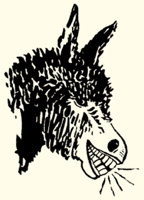 "But another boorow I had was even smarter. I noticed one night he seemed kind of sick. When I gave him a bucket of water, nice and cold out of the spring, he jest took as sip and let out a moan like a squaw with a bellyache, and gave me a dirty look.
"But another boorow I had was even smarter. I noticed one night he seemed kind of sick. When I gave him a bucket of water, nice and cold out of the spring, he jest took as sip and let out a moan like a squaw with a bellyache, and gave me a dirty look.
"I tried to make it up to him by givin' him a hot flapjack off my stack, and I noticed he held it in his mouth for two-three minutes before he swallowed it. Later on I noticed him drinkin' some warm water I'd set aside to wash up with. And all of a sudden I ree-lized that boorow had a toothache. I held out another hot flapjack and when he opened his mouth for it I saw the hole in the tooth. Well, next mornin' he was gone. He didn't come into camp for water like the others. But I was prospectin' around there some, so I didn't bother. It must of been about four days later when he showed up again jest as full of ginger as a boorow can get. No toothache no more. He walked right up to me, and opened his mouth and let out a terrific bray. And do you know what?
"They was a solid gold fillin' in that holler tooth. I spent months lookin' for the ledge he'd got if off of. I never did find it. It must of been the Breyfogle."
![]()
FROM BEAUMONT COMES THIS BY TED W. SMALL
Various honors have been paid me by fraternities and the military services, but the highest honor ever paid me was by an old moth-eaten "Jinney" belonging to old Mo, desert rat.
I had formed the habit of shedding my navy uniform and taking the train to the Palm Springs Station for a trip to the north face of the San Jacinto Mountain with Mo and "Jinney."
Up Snow Creek Canyon a pool tempted my yankee skin. Partly disrobed, Mo saw fit to shove me sufficiently so that I went into the pool with my pants on.
Mo laughed fit to kill; thumping his thighs with powerful whacks equal to his laughter.
Unobserved "Jinney" was in position. Exercising her sense of humor as well as her sense of fair play, she not too gently nudged old Mo, clothes and all, into the pool with me.
Her jackass laughter still rings in that canyon. I've been there in late years just to hear it, remember, and be happy because at long last I had been deemed worthy of "Jenny's" friendship.
BURRO LOVE SAGA
by Paul Wilhelm
Prince Paul Wilhelm's Dad traded old Chief Pushawalla a buckboard and two mules for Thousand Palms Oasis over a half century ago. Prettiest darn oasis on any desert. Paul's yarn sure belongs in this packet.
THE INSEPARABLES
One winter dusk two shaggy burros wandered into my oasis from Only-God-Knows-Where. They were such lovers, their names became Rhett and Scarlet. They stayed on with me for years.
Long pack trips we took together. But always together. Rhett wouldn't go any place without his soft-nosed, long-eared Scarlet; and that loyal lady wouldn't wander 100 yards from her Roman-nosed, clipped-eared Rhett without opening her mouth and crying 'till the ghosts in the old Indian cremation pits danced on the dunes: "Hee-haw! Hee-haw! Hee-haaaawwww!"
They became typical in my palm grove like the sight of smoke rising from the palm log hut and the smell of baked beans and carne; and the cry for the burros in the winter air — "Booo-rooo"—brought the clown-faced little donkey's around the log hut loaded with panniers of kindling for the night fire in my candle-lit casa.
When war called me to the colors, the Inseparables were given to Marshall South and his family. He hiked them over 100 miles to Ghost Mountain on the desert side of Julian. There they became his children's companions in a land more austere than my oasis borders.
The waterless mountain at last made it necessary to turn the lovers loose. There they wander today, in and around the haunted Vallecitos Stage Station, two aging animals never very far apart.
They've found green pastures, and friends in prospectors who give them handouts, where they roam free in an area one fifth the size of the state of Rhode Island. But that sad-faced pair could be happy at the South Pole so long as they had each other.
Theirs is a burro love saga still unwritten.
![]()
DICK WICK HALL
Knew His Burro's
"Sixty years ago the Indians chased an old prospector from the Colorado River to where Phoenix now is. He hit some of the high places and dodged around through the brush something like a spring chicken after a grasshopper—like a cricket on a hot stove—or the lady in the back seat. This old prospector made the trail you are now hitting. The natural and shortest route to the coast. The scenic highway—scenery high and in the way. But don't blame the old prospector—he was in a hurry. He knew the Indians were following him but he never expected you to—. . ."
![]()
Animals talk to each other, of course. There can be no question about that; but I suppose there are very few people who can understand them.
![]()
COLORADO'S
BURRO RACE
In the summer of 1949 the business men of Fairplay, Colorado, were discussing ways of adding new life to their annual Gold Days Celebration.
Since Fairplay rightfully claims the title of "Burro Capital of the World," it was quite natural that the Burro would be included along with the famed old trail of the pioneers over Mosquito Pass to Leadville, a distance close to twenty-three miles, and over a pass 13,188 feet high. So the result, a pack burro race.
Rigid rules of ethics and sportsmanship govern the sport. Mountain men do not take kindly to a cheat, nor do they look with favor upon abuse of their trustful donkeys, unless it is verbal abuse. The racers do not ride since the animal is already burdened with a normal fifty-pound pack of miner's equipment, such as pick, shovel and gold pans.
The best race time was made in 1952 when the trek from Leadville to Fairplay was accomplished in four hours and seventeen minutes.
(See "OLD PRUNES" a story by Everett Bair elsewhere in this edition, for mor about Fairplay, Colorado.) . .
![]()
A prospector over at Quartzsite, Arizona, that's spent 26 years out here in the desert, six years huntin' gold, and twenty years huntin' his three dadburned burros, told me this story today.
"Years ago," said he, "I put a bell on Sappho, my pet burro, and turned her loose to feed nights with Frankey and Johnny, a pesky pair of blues, the bell so's I can locate them in the mornin', they stayin' together. Well, lots of times I couldn't hear that bell and after spendin' most a day lookin' for 'em would find their tracks close by, I thought maybe I might be gettin' deaf, till one day after trampin' for miles, I found out how them pesky burros had been a trickin' me these years. I returned to camp and looked down into a canyon close by; there was Sappho, her head motionless over a large rock, and Frankey and Johnny bringin' every other mouth-full of grass over to her rock, so's she wouldn't move her head and ring that tell-tale bell."
Prospector and Showman
From the book FIGHTING MEN OF THE WEST
By Dane Coolidge
Copyright, by E. P. Dutton & Co, Inc.
Also available in Bantam reprint edition
Fifth Installment
"I sure will," responded Brown; and that was the last seen of him until, several years later, Scotty met him in Los Angeles, all dressed up and drunk. Brown was glad to see him and bought several drinks; after which, with great mystery, he took him to his room and showed him a sack of ore. It was the richest gold ore ever found in the United States, assaying around $400,000 a ton, and after flashing it Brown made a little speech. He recalled Scotty's kindness in buying feed for his poor mules and in saving them from the clutches of the sheriff; and then he mentioned the promise he had made, to let Scott in on anything that was good.
"This gold," he went on, "comes from a mine on the Colorado Desert that is owned by a millionaire in town. I've been hauling freight for him with my twenty-mule team. They ain't a miner out there, just Bohunk coal-diggers, and the foreman never saw gold in his life. I was driving past the dump last week when I saw some of this ore throwed away. It's covered with silica, of course, but I knowed it like a flash and that night I went out and picked up sixty thousand dollar's worth. I've put the rest in a safe deposit box. But there's plenty more where this came from, so go on out and get yours."
Scotty stepped into his big car and drove all night and the next morning he came to the mine. Here was the chance of a lifetime, not only to get some gold but to make another millionaire squeal. The owner of this mine had been selling stock to everybody, but it had never shown the color of ore and the Corporation was crowding him. Scott told the cook, who was the only man around, that he had come to look at the mine. Then he went to the dump and began digging out nuggets; and the cook, who had got his, donated a sack.
With three sacks of picked ore, Scott drove back to Los Angeles, and a few days later the news broke. But so thoroughly had the dump been worked over that the millionaire could not find a single nugget. In a fury he sent for Scotty and threatened to have him arrested for stealing his ore.
"All right," said Scott, "you do it, and we'll both go to jail. You've been selling stock in a mine you've never seen, talking the waiters and chambermaids into buying it; and now you're caught under the blue sky law without a pound of ore to show. All I've done is put some rich ore in a safety deposit box. Go ahead and prove it is yours."
This so frightened the millionaire that for his own protection he was compelled to buy back the ore. The stockholders all lost their money, the mine was closed down, but the millionaire had the ore to show when the Corporation Commission came around.
A day spent with Scotty while in a reminiscent mood was a long succession of stories about trimming millionaires—or about being trimmed by them. They can be trimmed, he contended, but even then it does not pay. The millionaires make too much trouble. When a man loses money at gambling he doesn't expect everyone he meets to hear about it and sympathize with him; but when a millionaire loses a dollar in the mining game he hangs onto you and tells it all over again. It is better to work alone, and dig out your own ore, rather than have them weeping on your bosom because they happened to get stung.
The truth is, Scotty was spoiled, as far as millionaires are concerned, by his partner, Albert M. Johnson. He was a man who was always giving away money—even to preachers, whom Scotty scorned. He was a game loser, a true sport, indulgent to a fault; and when Walter referred to him as his bookkeeper or banker he would laugh and let it go. Then he would tell people that Scotty was merely his caretaker, and eccentric prospector but a valued friend.
When Walter was shot through the arm he took the train to Chicago for treatment, and was taken in by his partner. Johnson had a fine residence in the most exclusive district and they gave Scotty the whole third floor. There were eight servants to wait on him but none of them would talk; and the place seemed like a tomb, without a drop of liquor in it. The doctor looked Scotty over, said he was suffering from a gunshot wound and prescribed absolute rest and quiet.
That was exactly what Scotty did not want—he wanted a quart of whisky, somebody to talk to and some medicine to cure his bum arm. When he heard what Johnson had paid the doctor for his visit he said if he ever came back he would kill him for a highwayman. It seems this fashionable doctor never prescribed anything in the way of medicine, his patients all belonging to cults which relied upon the powers of his mind, but Walter didn't know that.
He got another doctor and a quart of the best, slipped the servants ten dollars around and was beginning to find life tolerable when Mr. and Mrs. Johnson were called west. They were very sorry and left only on one condition—that Walter would consider the house his own and make himself at home during their absence. Scotty promised, and as soon as the Johnsons were gone he called all the servants together, gave them a piece of money all around and told them to have a good time—he wouldn't need them, except the cook to get his breakfast.
Scott then requested the maid to show him around, and the first thing he laid eyes on was a big sable coat that had cost Johnson thousands of dollars. He commandeered this coat, told the chauffer to get out his biggest car and with a four-bit cigar between his teeth set out to see the night life. That was his idea of perfect rest and quiet, and his wounded arm promptly got well.
In his own domain Scotty was equally hospitable. He was a wonderful cook, specializing in fried chicken, Southern style, hot biscuits, and many different kinds of perserved fruits, which he put up himself. In the old days, when he lived in a tent-house, the first act of hospitality was to kill three or four yellow-legged chickens, fry them in butter and serve them with mashed potatoes, canned corn and every other luxury that comes in cans. He would sit by the stove while the wintry winds were blowing and whenever the door swung open tha cats would slip in and cuddle up with the little, curly dog. But at the end of some story, or when he found them underfoot, Scotty would kick the door wide open and shout:
"Take 'em away!"
Instantly the cats would dart forth, the little dog would follow barking, and as he chased them out into the brush his master would look on grimly.
"Take 'em away!" he would bellow. "Let 'em go out and ketch gophers!"
Then the curly dog would come back and crawl under the stove again, with no shame for his perfidious act, and as the next story began one cat after the other would slip in and cuddle down beside him. It was just a game with them, a harmless vagary on the part of a master who was otherwise more than generous with his chicken meat.
But as the country quieted down and Johnson brought out his rich friends, the tent-houses were torn down and in their place a huge building rose up. It was made of metal lath covered with plaster, and ugly to a degree; but about the time it was finished it too was torn down and the Moorish castle begun. There were landscape gardeners to build moats and mosaic walls. Edna May and Lookout were hitched up to haul stone and Scotty became a caretaker right.
He never lived in the palace, more than to move into a back room, but spent his time showing tourists through the arabesqued halls or the gleaming, white-tiled kitchen Finally he moved out entirely, building a shack out of beaverboard, with half-inch cracks in the floor; but the old days were gone and he wandered about uneasily, saying little or nothing about his mine. The same Indians who had hung around his camp at Warm Springs moved up and built their wickiups along the ditch, but there was no desert scouting for them now. The brave, fighting days were over and Scotty was getting fat. No one believed he had ever had a mine.
The End
THE TRUE STORY OF SCOTTY
As told by George Palmer Putnam. George found the best in Death Valley.
Read his Book "Death Valley and Its Country"Once a newspaper man went to the Castle.
"Scotty," he said, "Mr. Hearst has told me to write your straight story. From the beginning up to date. No matter how long it takes, I'm going to dig up the facts.
"Okay," said Scotty "I'll help you. Don't just get the stuff from me. You go to these people who know me. Get the dope form them and then come back."
Scotty gave his visitor half a dozen names. They were men of Reno, Las Vegas, San Francisco, Los Angeles, Chicago.
Weeks later the writer returned.
"See 'em all?" Scotty asked.
The writer nodded. "Every one of them. They all talked, too, very cooperative."
That's fine," said Scotty. "Between 'em they know all about me."
"The trouble is," the reporter went on, "each one told me an altogether different story."
Which is the way it is. And, I think, likely evermore shall be.—George Palmer Putnam
NO ROOM FOR THE ADVERTISERS THIS TIME
--BUT ROOM FOR A FEW MORE BURROS
THE BURRO STORY
Charlie—Charlie Lockwood, that is, must think I know everything for on his visits to Old Fort Oliver, he is always putting questions to me about the deserts, the mountains, the rivers and the animal life connected with them.
One night last Winter we were sitting before the open fire at Old Fort Oliver, smoking our pipes and listening to the wind and one of our infrequent rain storms, singing their clarions over and about the Fort, when Charlie put forth one of his questions: "Where did the burro come from?"
Of course I have delved into this bit of history and was somewhat qualified to answer the question. So I humorously said: "Charlie—you're a writer and undoubtedly know where to find that information, but I'll tell you where I got my data, if you wish: If you will look in the Century Book of Facts, under the heading of "Ass," also under the heading of "Mule," and if you want to go further, read under the heading of "Andalusia." If you will pursue these three articles you'll have all the information you need for a story.
Write up your findings, Charlie, and we'll publish the article in my paper, so that, once and for all, people will know where the burro came from.
WHAT ABOUT THE BURRO?
By: Chas. Lockwood
Yes, that's what I said, "What about the Burro?" Where did he come from? Is he smart or dumb? What are his characteristics and how did get to this country?
These are questions that have been asked many times, so let's take the points is sequence, starting with his origin. In the first place the donkey, or burro, has been a friend to man, far longer than the horse or mule, and maybe even the dog. Originally the burro was commonly known in the days of old, as the ass. It is still refered to as an ass by many folks in the eastern part of our country and by other people throughout the world. But if you were to ask a Mojave or Borrego Desert Rat, if he has a pet ass to carry his traps and duffle, he'd more than likely say: "Hell no! I never heard of a pet ass—I use burros to haul my stuff." The D.R. who innocently replied to your question with this answer, would probably be unaware of the fact that they are one and the same, for on the western deserts there are no asses—just burros!
But on with the story: As I say, the ass has been a friend to man for a very long time. In the pre-biblical days, they ran wild on the deserts of Egypt, Asia and Africa and were domesticated man years before the horse found himself in the pasture of his owner. These wild fellows can still be seen on the Nubian Desert and in the arid expanses of Asia. In eastern Mongolia and Tibet, they are known as the "kiang" and "onager."
People who have seen these wild donkeys, say that they are one of the fleetest animals on hoof, that they are intelligent and have courage to burn. However the domesticated burro of our country does not descend from the "kiang" nor the "onager" but comes from the wild breed in Africa adn Abyssinia. But this line of donkey is even more stalwart than the Asiatic breed.
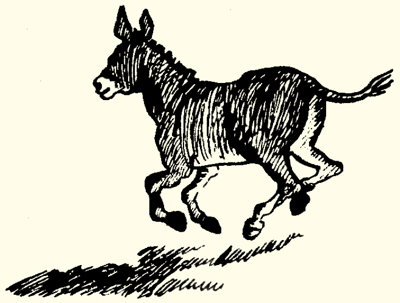
The ass early acquired the reputation of being stupid—this because of his inherent balky disposition, and, at times, his headstrong attitude. Nevertheless this will be repudiated by any prospector of our own desert country, for many and many's the time he has had to rely upon his burro to get him out of a hole—or should I say, to a hole—of water! Anyone who has had a burro as a pet, or has traveled the arid wastes with one, will swear that they are as smart as humans: this might be a slight exagera - - - - well, let's just let it go at that.
But not so with our forebears—they did not reckon with his intelligence, but honestly thought him dumb. And when they wanted to picture anyone under par, mentally, they would signify it by drawing him with the long ears and head of the ass. In the Middle Ages, the Germans depicted Thomas, the unbelieving apostle, by the ass, and tradition has it that the last youth who arrived at school, on St. Thomas Day, was given the name of "Ass Thomas."
In southern Europe, after the ass was domesticated, great care was taken in their breeding and from this endeavour a fine line of donkey was developed. Andalusia, in southern Spain, was the center of this stock raising scheme and it became famous for the success that was obtained. The project is still in vogue in this foreign region.
There are several theories as to just how the donkey was introduced onto this continent, but my records have it, that the Catholic Priests who came to Mexico to convert the Indians and to explore the country, brought the little fellow to this land: that is at least in any great numbers. Mexico being arid in many parts and the Priests knowing tha adaptability of the donkey to desert land, sent to their Native Spain for the animals. From this introduction they spread all over the western deserts and in time came to be used by the Desert Rat, the miner and the prospector, as beasts of burden.
But now let's take a look at the burro and make note of his characteristics, his talents and his traits. As almost everyone knows, he is much smaller than the horse, weighing about 350 pounds and standing approximately 10 hands high. He seems to have an almost inexhaustible endurance and therefore adjusts more readily to the waste lands than any kindred beast. He is surpassed in this quality, only by the camel and even here the distinction is not too great. He has a pretty good hold on life too, for where a horse will live 18 or 20 years, the burro will surpass these marks. One of his most admirable talents is that he has an instinctive understanding or wisdom, which has made him of incalculable help to the desert people and has endeared him to those who have benefited from this trait. It is this very ingeniousness that makes him capable of looking out for himself in arid territories: and this he does, running wild, uncared for and unassisted on our western deserts. The burro, as if he were bred for the purpose, can stand exposure probably better than other beasts of the kind. He is patient and when raised with children, makes an excellent pet: through his cunningness and cleverness he can often impart a lesson in mother wit, to these very children. He can climb over the worst rocky terrain, up and down narrow paths, across the ridges of high cliffs and it can be said, in all truthfulness, that he is as sure-footed as a mountain goat. A wonderous thing about the burro's teeth, is that his molars grow up from the jawbone as fast as they wear off at the crown.
So therefore, our questions about the burro are answered. He is tiny, but smart and I know it is the wish of all desert folks, that he'll continue to thrive and that he will be around for a long, long time.
![]()
Those who'll play with cats must expect to be scratched.
![]()
Tourist: "Are you going to let that Burro do as he pleases? Where is your will power?
Old Timer: "My will power is O.K. you just come over here and measure his won't power.
—Calico Fred
![]()
Cross a she-ass with a stallion and you get a hinny; cross a male ass with a mare and you get a mule; cross a mule and you will get your head kicked off.
—Geo. A. Stingle of South San Gabriel
![]()
If you are too busy to laugh—you're too busy.
![]()
The Burro hiding behind his absurd face has a keen intellect, is a great actor, and has long taken his part in entertainment. Some are used frankly as museum pieces. Owners of roadside establishments in the Southwest often park one or two outside to lure tourists. Rodeo clowns train them as comedy mounts, and they are used for laughs in softball or basketball games where the players are mounted. A burro race is staged in Colorado each year, from Leadville to Fairplay. Also Death Valley has its Burro-Flapjack race. In the dude and pack-trial business, eleven burros pack about as much as six horses, eat less, and are surer-footed. Several outfits, including the Sierra Club, of San Francisco, use burros for pack animals on hiking trips over the John Muir trail. Burros are also standard equipment without which no buried-treasure expedition would be official.
![]()
The Battle Of Hee-Haw
From The Saturday Evening Post
by Neil M. Clark
For his enduring accomplishments, the burro has received little credit. Shelves groan with books about dogs and horses, but it's a rare library whose card catalogue turns up even half a dozen listings on the burro.*** Reasons for this neglect may be found in the character of the burro. He is an independent cuss.
The worst thing about him is his voice. This is more terrible than any hack tenor's, and he uses it at the wrong times, usually at night when people want to sleep. It has won him such derisive nicknames as "Rocky Mountain canary," "Colorado mocking bird," and others not fit to print, and upon occasion it has been his undoing. United States cavalry encamped on the Mexican border during the Villa troubles, rose as one man one night and went forth with drawn sabers. At dawn next day, 250 burros that had been murdering sleep were found dead on the drill field. It was the bloodiest battle those soldiers engaged in.
***Maybe this paket will fix those librarys up—anyway Duncan Emrich says all folklore collections should have my paper.
NO BURROS - NO GOLD
Page 5
From my book Desert Rough Cuts. I wrote this 24 years ago when the Ford I use today was 3 year old. You sure can't tell how long a Ford or a Burro will live.—H.O.
"A Ford will live three years here in the desert—a dog three times the years of a Ford—a horse three times the age of the dog—a man three times the age of the horse—and a burro lives three times tha age of the man."
It was Sandy Walker a'talkin' to the regular bunch of counter-sitters at the Busy Bee store. Even Col. Kashin didn't stop him after that three times eighty-one, all was too busy a'figurin' I guess, and on he went.
"You never see'd a dead burro none o' you; aint any of you goin' to live long enough to know how long they live either?"
"An' you what's prospectin' with Fords is outa' luck, you won't find gold. Why they's cut roads an' railroads into mountains an through deserts an' across all kinds o' land for years an' never hit gold on roads, you gotta get out with burros an' find it."
"I been out here in the desert twenty-six years, six years huntin' for my burros. I didn't find my mine while I was huntin' gold either, I found it while I was a'huntin them dad-burned run-a-ways."
"Them Ford ridin' prospectors wasn't sayin' nothin' jest a'lookin' at each other like sheep. Did you ever think what us desert rats owes to burros?" "What about those water holes? Every last one of 'em coverin' fifteen hundred miles from here clear up to the Snake River is known to us because a burro found it."
"You don't have to hunt Fords," says Jake Topper.
"Suppose that's mighty consolin'," snorts Sandy as he steps outside, then all of a sudden the air gets blue. It's Sandy lettin' out the longest, finest string of cuss words we've heard in these parts, I come a'runnin' to see what was wrong. It was a'plenty. His burros got loose an' was hittin' off for the horizon as tight as they could go.
"Come," says I to sandy, "get in the Ford, we'll round 'em up."
As we chugged along on three cylinders the old flivver hotter 'n a cowboy's pistol on the Fourth of July, homeward bound after hours of high class cussin' an' wranglin', I was admittin' to Sandy that burros rate prize number one for enlargin' desert cuss word vocabularies.
"Stop," yells Sandy lookin' across the wash we're ridin' down. "That's likely lookin' rock yonder," and that Dear Posterity is when and where we staked out claims on the now famous Burroford Mine.
The BURRO: Is the only animal with a sense of humor.

All text was hand-entered (no OCR scans) by Dick Oakes who did the layout, markup and graphics reproduction (all of Harry's misspellings retained). The contents remain the property of Bill Lincoln and his heirs.
